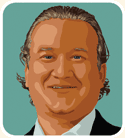El Salvador is facing multiple threats to democracy. High crime, a slow economy and persistent poverty join more modern issues such as urban governance, reduced competitiveness and stagnant productivity. While these challenges disappoint members of the electorate, consistent political bickering is also a turn-off to a base of voters that desperately cries for moderation.
Political elites, who at times seem trapped in a time warp circa the Cold War, often refer to each other as mata vacas (cow killers) and escuadroneros (death squad members) in direct reference to terms used during the country’s civil war.
Political moderation in El Salvador doesn’t have a strong track record; whenever emerging figures have embraced it, regardless of party, their political careers are cut short.
For instance, in 2003 Evelyn Jacir de Lovo ran for mayor of San Salvador on behalf of the Alianza Republicana Nacionalista (Nationalist Republican Alliance—ARENA) party. Jacir de Lovo had served as education minister under the administration of former President Francisco Flores (1999-2004) and had been historically close to Catholic groups working with refugees in the 1980s. Her platform emphasized the need to bring ARENA from the Right to a more centrist position. She failed.
Similarly, it has been widely documented how the Frente Farabundo Martí para la Liberación Nacional (Farabundo Martí National Liberation Front—FMLN) has purged anyone within its ranks who publicly calls for progression from the Left to a modern, left-of-center party.
The next presidential election doesn’t take place until early 2014; however, both major parties have already chosen their candidates. FMLN has, for now, decided on Salvador Sánchez Cerén, the current vice president and last historical figure of the 1980s. ARENA officially proclaimed San Salvador Mayor Norman Quijano as its candidate. For now it seems unclear whether or not there will be a third candidate. Speculation lingers that former President Antonio Saca (2004-2009) will run again.
As the field of candidates becomes rather clear this far in advance, the expectation of moderation in political discourse and policy proposals should grow.
El Salvador’s stagnant situation is in urgent need of some show of good faith—and leadership. According to the UN Economic Commission for Latin America and the Caribbean (ECLAC), El Salvador’s paltry 1.4 percent growth rate in 2011 was the lowest in Central America. In terms of fiscal policy, despite President Mauricio Funes’ denials to the contrary it was widely reported in local media that the Treasury’s cash flow—or lack thereof—caused a delay in salaries being paid to police officers last month. Univisión even reported the government was at the brink of bankruptcy, although Funes quickly rejected this notion.
While it is understandable that the FMLN and ARENA will be tempted to adopt ideological policy positions that tend to their party bases, both parties must recognize that the thousands of independent voters that gave Funes his victory are crucial for a first-round victory. These same independents shy away from extremist positions.
El Salvador is not in a position to experiment with the traditional tactic and strategy of polarization. Today, more than ever, a young electorate looks for a divergence from Cold War lingo and instead favors issue-based dialogue and bipartisan solutions. In the interest of El Salvador one can only hope that all presidential candidates—declared or not—recognize how crucial reaching across the aisle will be.
Julio Rank Wright is contributing blogger to AQ Online. He is from San Salvador, El Salvador, but temporarily lives in Washington DC.





